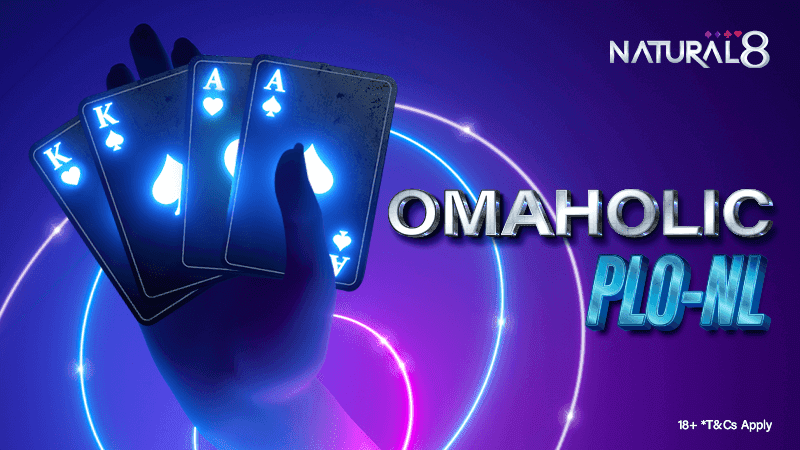-
Pot Limit Omaha (PLO)

Play Omaha Poker Games Online (PLO Poker)
Omaha Poker is an exciting poker game that is derived from Texas Hold'em. Players are dealt FOUR hole cards (or sometimes FIVE in PLO-5 and SIX in PLO-6) instead of TWO which increases the number of combinations you’ll be able to create. More cards, more exciting possibilities!
Create your Natural8 account and experience the excitement of PLO Poker!
Omaha Poker Games at Natural8
Natural8 features a wide variety of Pot Limit Omaha games suitable for all bankrolls with buy-ins starting from as low as $0.20. If you’re up for a challenge then we’ve got just the game for you, PLO-5 & PLO-6. These two variants of PLO on steroids feature FIVE & SIX hole cards respectively and bring even more excitement and variance to the game.
Pot Limit is a betting limit imposed in a poker game whereby no raise may be greater than the amount in the pot at the time the raise is made.
Exclusive Features & Promotions
Elevate your online poker experience when you play poker at Natural8. We pride ourselves on offering a safe, fair, and fun gaming environment for our players. Our poker games are powered by cutting-edge technology, ensuring a seamless and immersive experience every time. Plus, with our generous promotions and bonuses, you'll have even more opportunities to boost your bankroll and take your game to the next level.
Exclusive Features

Pokercraft
A powerful and easy to use poker tracker that keeps track of your entire poker journey.
Learn More

Smart HUD
Quickly learn your opponent's and your own tendencies and use them to your strategic advantage.
Learn More

Card Squeeze
Squeeze your cards anyway you like with our real life-like 3D Card Squeezing feature.
Learn More

Table Features
Enjoy the extra thrills and elevate your game with our game-changing table features.
Learn More
Exclusive Promotions

Fish Buffet Cashback
Get up to 60% Fixed Cashback weekly. The more you play, the more you earn!
Learn More

Omaha Leaderboard
Accumulate points and climb up the Omaha Leaderboard to win daily prizes.
Learn More

Bad Beat Jackpot
When life gives you lemons, we turn it into lemonade. Everybody wins!
Learn More
Play Omaha Poker Risk-Free With Play Money
Want to test your skills and strategies without risking any real money? The Play Money tables are the perfect way to do just that. Play Money are free chips that can only be used on Play Money tables where blinds are displayed with a ‘P’. As an existing player, you can claim up to P10,000 every four hours to keep the fun going. And for new players, you'll start with a generous P20,000 to play with.
Just remember that Play Money has no cash value and cannot be used in conjunction with real currency or tickets. But with plenty of opportunities to practise and improve, Play Money is a great way to prepare for the real deal.
Additional Information:
Existing players can claim/recharge up to P10,000 every four hours, up to a maximum of two times daily. (Newly signed-up players will receive P20,000 to start)
Play Money has no cash value and cannot be used in conjunction with cash, CP, TP, or any other currency or ticket.
Some features may not be available on Play Money tables.
Play Money eligibility is subject to the terms and conditions of the player’s jurisdiction.
PLO Table Information
| Stakes | SB | BB | Default Buy-in | Rake % | Rake Cap ($/BB) | |||
|---|---|---|---|---|---|---|---|---|
| 2 players | 3 players | 4 players | 5+ players | |||||
| High | $10 | $20 | $200 | 5% | 0.313BB | 0.625BB | 0.938BB | 1.25BB |
| $5 | $10 | $100 | 5% | 0.375BB | 0.75BB | 1.125BB | 1.5BB | |
| $2 | $5 | $50 | 5% | 0.375BB | 0.75BB | 1.125BB | 1.5BB | |
| Middle | $1 | $2 | $20 | 5% | $1 | $2 | $3 | $4 |
| $0.50 | $1 | $10 | 5% | $0.50 | $1.00 | $1.50 | $2 | |
| $0.25 | $0.50 | $5 | 5% | $0.25 | $0.50 | $0.75 | $1 | |
| Low | $0.10 | $0.25 | $2.50 | 5% | $0.19 | $0.38 | $0.56 | $0.75 |
| $0.05 | $0.10 | $1 | 5% | $0.08 | $0.15 | $0.23 | $0.30 | |
| $0.02 | $0.05 | $0.50 | 5% | $0.04 | $0.08 | $0.11 | $0.15 | |
| $0.01 | $0.02 | $0.20 | 5% | $0.02 | $0.03 | $0.05 | $0.06 | |
PLO-5 Table Information
| Stakes | SB | BB | Default Buy-in | Rake % | Rake Cap ($/BB) | |||
|---|---|---|---|---|---|---|---|---|
| 2 players | 3 players | 4 players | 5+ players | |||||
| High | $10 | $20 | $500 | 5% | 0.313BB | 0.625BB | 0.938BB | 1.25BB |
| $5 | $10 | $200 | 5% | 0.38BB | 0.75BB | 1.13BB | 1.5BB | |
| $2 | $5 | $100 | 5% | 0.38BB | 0.75BB | 1.13BB | 1.5BB | |
| Middle | $1 | $2 | $40 | 5% | $1 | $2 | $3 | $4 |
| $0.50 | $1 | $20 | 5% | $0.5 | $1 | $1.5 | $2 | |
| $0.25 | $0.50 | $10 | 5% | $0.25 | $0.5 | $0.75 | $1 | |
| Low | $0.10 | $0.25 | $5 | 5% | $0.19 | $0.38 | $0.56 | $0.75 |
| $0.05 | $0.10 | $2 | 5% | $0.08 | $0.15 | $0.23 | $0.30 | |
| $0.02 | $0.05 | $1 | 5% | $0.04 | $0.08 | $0.11 | $0.15 | |
| $0.01 | $0.02 | $0.50 | 5% | $0.02 | $0.03 | $0.05 | $0.06 | |
PLO-6 Table Information
| Stakes | SB | BB | Default Buy-in | Rake % | Rake Cap ($/BB) | |||
|---|---|---|---|---|---|---|---|---|
| 2 players | 3 players | 4 players | 5+ players | |||||
| High | $10 | $20 | $500 | 5% | 0.313BB | 0.625BB | 0.938BB | 1.25BB |
| $5 | $10 | $200 | 5% | 0.38BB | 0.75BB | 1.13BB | 1.5BB | |
| $2 | $5 | $100 | 5% | 0.38BB | 0.75BB | 1.13BB | 1.5BB | |
| Middle | $1 | $2 | $40 | 5% | $1 | $2 | $3 | $4 |
| $0.50 | $1 | $20 | 5% | $0.5 | $1 | $1.5 | $2 | |
| $0.25 | $0.50 | $10 | 5% | $0.25 | $0.5 | $0.75 | $1 | |
| Low | $0.10 | $0.25 | $5 | 5% | $0.19 | $0.38 | $0.56 | $0.75 |
| $0.05 | $0.10 | $2 | 5% | $0.08 | $0.15 | $0.23 | $0.30 | |
| $0.02 | $0.05 | $1 | 5% | $0.04 | $0.08 | $0.11 | $0.15 | |
| $0.01 | $0.02 | $0.50 | 5% | $0.02 | $0.03 | $0.05 | $0.06 | |
Play Money
| Game Type | Blinds (SB/BB) | Buy-in | Rake | Rake Cap (BB) |
|---|---|---|---|---|
| Pot Limit Omaha | P200 / P500 | P5,000 | 5% | P1,500 |
| PLO - 5 | P200 / P500 | P5,000 | 5% | P1,500 |
| PLO - 6 | P200 / P500 | P5,000 | 5% | P1,500 |
*3-bet pots preflop are raked. In a single raised pot preflop where everyone folds, there is no rake. All pots that see a flop are raked.
*All Omaha tables are 6-max
Learn How To Play PLO Poker
New to the game? We’ve got you covered from the basics such as poker hand rankings, all the way to more advanced strategies. Our Poker School is specially designed to suit poker players of all levels.
Frequently Asked Questions (FAQs)
If you need more assistance, feel free to contact our friendly support staff who are ready to assist you 24/7.
Is there a minimum number of players at a Pot Limit Omaha table?
Yes, the minimum number of players at a table is 2.
Is there a maximum number of players at a Pot Limit Omaha table?
Yes, the maximum number of players at a table is 6.
What does Pot Limit refer to in PLO Poker?
Pot Limit is a betting limit imposed in a poker game whereby no raise may be greater than the amount in the pot at the time the raise is made.
What are buy-ins?
Buy-ins refer to the amount of money you have to use to buy into the game. There are different buy-in levels on Natural8, so you can choose the one you are most comfortable with.
What is rake?
Rake is a commission fee taken by a poker room for operating the game. Rake is common in the industry and is capped at 5% at Natural8 PLO tables.
Terms & Conditions
- Players must be aged 18 and above to participate in this promotion.
- This game uses 1 deck of 52 cards and the deck is shuffled after each hand.
- Amount committed to the pot will still be in play in the event of a disconnection. Natural8 players accept the risk of internet disconnection, due to problems with the connection between their device(s) and the servers, lag or freeze or some other problem in the player’s device(s) or how that device accesses the internet.
- This promotion is subject to the terms and conditions of the Natural8 website.
- Natural8 is an advocate of safer gambling. If you feel you might have an online gambling problem, do seek further advice or counseling at www.begambleaware.org
























